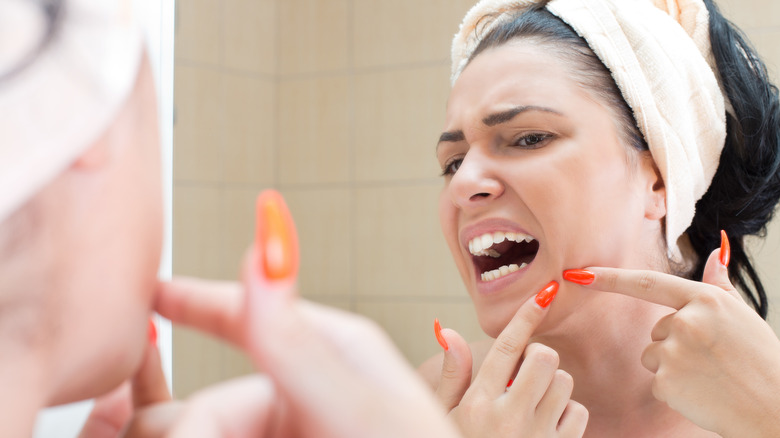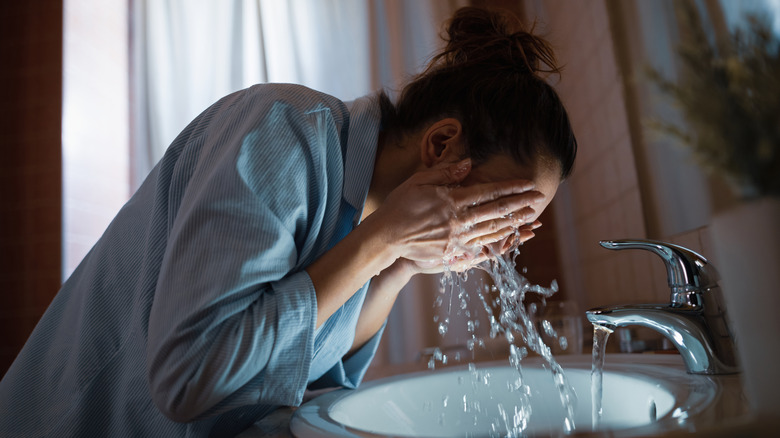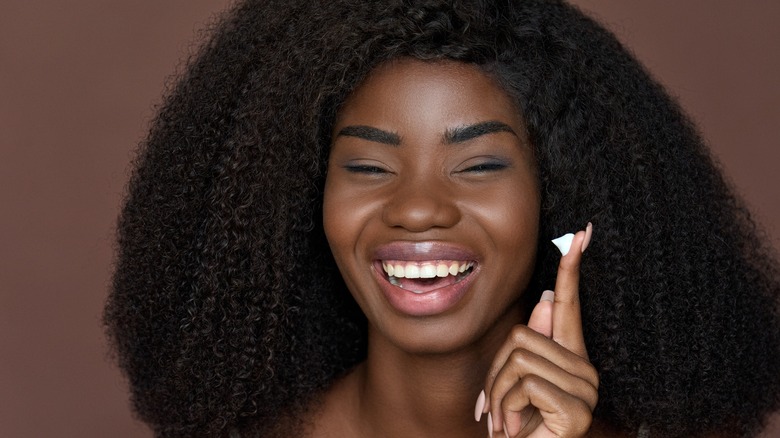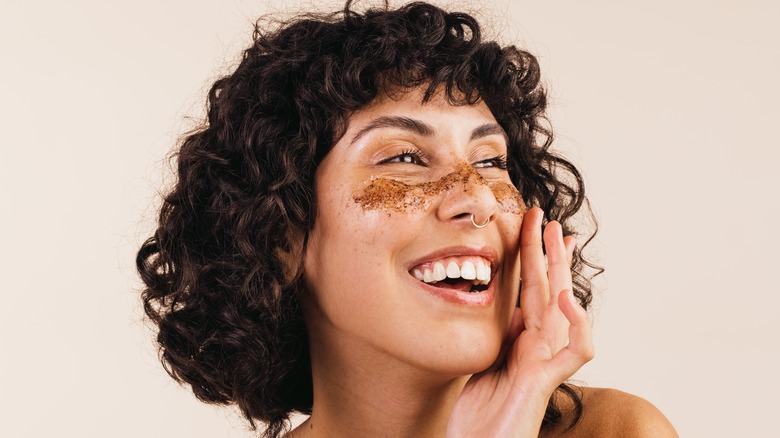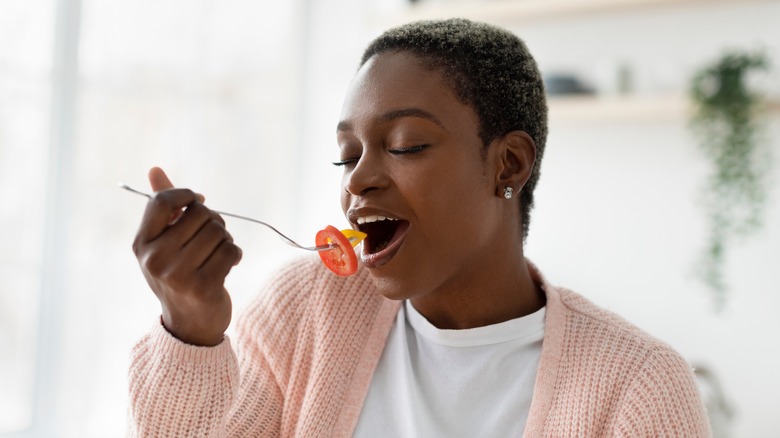Bad Skincare Habits You Need To Break For Better Skin
We may receive a commission on purchases made from links.
Although skincare is a science, it's not always an exact science. If you go searching for answers to your skincare problems, you might find that people with your skin type have found the opposite things to work for them. Even if people use a product specifically formulated for their skin type, they still might not get the best results. And that's because even people who share the same skin type can have slight quirks that change what works best for them.
This only leaves you to experiment with the skincare products formulated for your skin type to find the best fit. But as we all know, that can be a time-consuming process, which can lead to anything from allergies and irritations to deeply unsatisfying results. Of course, by the end of it, you're more likely to find a combination of products that gets you to your dream skin. And that's always a reason to keep persevering through the trial and error phase.
Sometimes, you can do it all. You can use every product, try different combinations, active ingredients, and much more, and still not get the results you seek. And that's because your bad skincare habits are hindering your progress. Sometimes, what your skin needs isn't another serum, but simple lifestyle changes that can make all the difference.
Picking and popping acne
Although we all know that picking at your acne is never a good idea, sometimes, the temptation can be too hard to resist. If a pimple pops up when you're going to get an important photo taken, you might feel like you have no choice but to get rid of it. Other times, it's just a plain and simple annoyance that you don't want to deal with anymore. While we know that scarring is a big concern with pimple popping, several lesser-known issues can be just as damaging.
As Dr. Sejal Shah, dermatologist, explained to Teen Vogue, "Often picking or popping worsens the situation, and the skin doesn't heal, you may end up with a larger bump than you started with or new bumps, and there is an increased risk of pigment change, either residual redness or hyperpigmentation, and scarring." So, your best bet is to just let the pimple run its course. And if that's too difficult, there are a couple of things you could do to speed up the healing process or make the pimple less glaring.
For a quick fix solution, your best bet would be to get the pimple professionally extracted by a dermatologist. For a longer but less expensive solution, regularly wash your face and pop on a pimple patch before bed. Another great solution would be to use spot treatments that have around 2% of benzoyl peroxide. To naturally pop the pimple, apply a warm compress to the area a few times a day.
Skipping your nightly skincare ritual
Everybody knows that washing your face is an easy but essential step in a skincare routine. Generally, experts recommend washing your face twice a day, once when you wake up and once before you sleep. For most of us, it's easy to get the first wash of the day in, but after a long day at work, sometimes you simply don't have the energy for a good cleansing. However, it's best to push through and get it done.
Speaking to Allure, board-certified dermatologist Joshua Zeichner recommended, "If you're going to skip [a wash], then it's better to skip the morning one than the evening one. At night, you want to remove the dirt, oil, and particulate matter that accumulate during the day." Letting your face sit in all this grime overnight can lead to acne. If you use makeup without a proper nightly removal routine, you also run the risk of eye irritation the next day.
But cleansing your face goes beyond splashing some water on it. After washing your face, you need to cleanse your makeup off with a gentle makeup remover. Then, use a cleanser to give your face a thorough cleaning. Optionally, you can go in with a toner to get rid of any dirt remnants, hydrate your skin, and help in better absorption of your spot treatment, night cream, and facial oils. If you don't use these products, you can close things off with a light moisturizer.
Stepping out without adequate skin protection
Many of us invest time and money in crafting the perfect skincare routine. In the pursuit of creams, face peels, and serums, it's easy to forget about a basic like sunscreen. It's easy to think that if you don't spend too much outdoors, sunscreen is optional, but that's not the case. Even on days when you're not stepping out or on overcast days, you still need to don sunscreen to protect yourself.
According to a study, 80% of visible signs of aging can be attributed to UV exposure. UVA rays from the sun seep into the dermis layer of your skin and hinder collagen production, which causes your skin to lose its elasticity. It also leads to an abnormality in elastin, which can lead to wrinkling. Even indoors, the UVA rays can reach your skin through windows. Prolonged exposure to the sun's UVB rays can give you a nasty sunburn, and increased exposure to UV rays can even lead to skin cancer.
To protect yourself against this, you should wear a broad-spectrum sunscreen that blocks UVA and UVB rays and has an SPF of at least 30. If possible, avoid stepping out when the sun's strongest, between 10 a.m. and 2 p.m. For extra protection and style, you can add a hat to your outfit for the day. You can also use skincare products that have UV protection built-in.
Exfoliating the wrong amount
We've all heard the phrase, "Too much of a good thing can be bad," and when it comes to exfoliation, that's definitely the case. There's no denying that you should make regular exfoliation a part of your skincare routine. Exfoliation is a great way to help your pores breathe better by ridding them of dead skin cells. As Lily Talakoub, MD, explained to Eccotique, "Dead skin seals the pores, so when sebaceous glands produce oil, it's 'stuck' under the dry skin. This causes breakouts because there is nowhere for the oil to go."
When your pores are free of dead cells, you also might just be blessed with fresher skin that has a gorgeous glow. When there's not much clogging your pores, your skin products will be able to go deeper to get better results. But overdoing exfoliation is a no-no, because you'll get the opposite of what you want.
Instead of giving you the supple glow you seek, it can lead to dry, sensitive, and flaky skin. It can also leave you to deal with more breakouts and give your skin an uncomfortably tight feeling. At most, you should exfoliate three times per week. If you have oily skin, you might benefit from an additional exfoliation session a week. For extremely sensitive skin, try to keep it to once or at most twice a week.
Not incorporating enough antioxidants into your day
Antioxidants are an underrated aspect of your skincare routine, and they can bring you several benefits. They can help you deal with the ill effects caused by sun exposure. Speaking to Dermstore, Dr. Ashley Magovern explained, "By definition, all antioxidants have anti-inflammatory properties. They blunt your skin's inflammatory response to the sun's harmful rays, preventing sunburn and providing enhanced protection against sun damage and photoaging." Their anti-inflammatory properties also help them calm overly-sensitive skin and aid in healing.
They can also brighten your skin by providing it with much-needed hydration. Antioxidants can also help rejuvenate your dermis and reduce the signs of aging by giving your collagen and elastin production a boost. One of the most well-known anti-aging solutions, retinol, is actually a type of antioxidant, Vitamin A.
Antioxidants come in many forms. You can get them in topical skincare products, oral supplements, or through an antioxidant-rich diet that's packed with fruits and veggies. If you get them by eating, your whole body will reap the benefits whereas, with topical application, only your skin will feel nourished. Some of the best antioxidants for the skin are Vitamin C, E, and A, niacinamide, and Coenzyme Q10. You can also double down and get topical products with a good combination of antioxidants.

